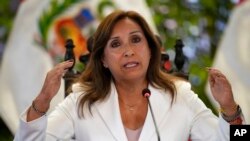Peruvian President Dina Boluarte called on Congress Friday to approve a proposal to move elections forward to late this year, a marked concession from the leader who has been facing daily protests that have left almost 60 people dead.
Boluarte had already expressed support for holding national elections in April 2024, rather than the previously scheduled 2026, but support seems to be growing among lawmakers to move them forward even earlier, to December 2023.
Moving elections to later this year could help the country "get out of this quagmire we're in," Boluarte said Friday after participating in an event to publicize the government's efforts to send medicine and other goods to an Andes region at a time when protesters have blockaded several key highways as part of anti-government demonstrations.
Boluarte, the former vice president, became president on December 7 after her predecessor, Pedro Castillo, was impeached for trying to dissolve Congress. He was later arrested and detained.
Protests quickly broke out across the country, with demonstrators taking to the streets to demand Boluarte's resignation as well as the dissolution of Congress. Amid the unrest, 56 people have died, including at least 45 in direct clashes with security forces, according to Peru's ombudsman.
"The protests continue. There are more blockades and violence," Boluarte said, noting she had talked with ministers about the possibility of moving the elections forward. "I'm here because I took on a responsibility and will be here until Congress sets a date. That's why I ask: Come to an agreement."
Boluarte added that she had no interest "in staying in the presidency."
Protests against Boluarte had been focused in remote areas, largely in the south, where voters had a particular affinity with Castillo, the first Peruvian president from a rural Andean background. Last week, thousands of protesters descended on Lima and have carried out nearly daily demonstrations in the downtown area of Peru's capital.
Boluarte has spoken up against the demonstrations, characterizing them as violent and claiming they are being funded by illegal miners and drug traffickers in an effort to sow chaos for political gain. She has also praised police, who have used tear gas and pellets to repel protesters in Lima.
The Defense Ministry said Thursday that the armed forces would support an effort by police to lift ongoing blockades on highways that the government says are causing shortages and price increases in certain parts of the country.
There are 89 road blockades in the country, largely focused on the country's south, according to Peru's ombudsman.




